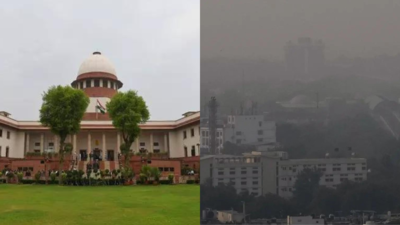
New Delhi: Supreme Court Monday refused to relax the Graded Response Action Plan (GRAP)-IV measures aimed at curbing air pollution in Delhi and said it would consider easing restrictions only after a clear downward trend in pollution levels is observed.
The court has scheduled a hearing for December 5 to review the applicability and potential modifications of the GRAP-IV directive.
The court expressed dissatisfaction and pointed out that Jokes-4 Measures including banning truck entry and construction activity were not effectively enforced.
“There has been little implementation of GRAP Phase 4 to tackle air pollution in the national capital,” the bench said, questioning the number of officials deployed by the Delhi government to enforce the restrictions.
The court highlighted the “complete lack of coordination” between the Municipal Corporation of Delhi (MCD), Delhi Police, Delhi Pollution Control Committee (DPCC) and other entities and asked the Council of Air Quality Management (CAQM) to coordinate their activities under GRAP-4 measures.
The Supreme Court noted that none of the NCR states (Delhi, Rajasthan, Haryana and Uttar Pradesh) had complied with its directions to pay compensation to construction workers and directed that Delhi, Haryana, Uttar Pradesh and Rajasthan The Chief Secretary appeared virtually on December 5 to discuss the implementation of pollution prevention and control measures.
In addition, the Delhi government is also responsible for investigating allegations of non-compliance with GRAP restrictions.
Delhi’s air quality improved slightly for the second day in a row on Monday, shifting from ‘very poor’ to ‘poor’ category. The city recorded air quality index The air quality index (AQI) in the morning was 273, while the 24-hour average AQI on Sunday was 285, according to the Central Pollution Control Board (CPCB). The improvement comes after 32 consecutive days of “very poor” or “severe” air quality, during which AQI levels consistently exceeded 400.







